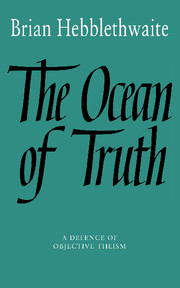Book contents
- Frontmatter
- Contents
- Preface
- 1 Christian belief in God
- 2 The ebbing of theistic faith
- 3 The interiorisation of faith
- 4 Theism in the modern world
- 5 The significance of Kant
- 6 The grounds of theistic belief
- 7 The question of truth
- 8 Religions – theistic and non-theistic
- 9 Life after death
- 10 The Christian Church and objective theism
- Appendix: The Church's ministry
- Notes
- Select bibliography
- Index
5 - The significance of Kant
Published online by Cambridge University Press: 06 July 2010
- Frontmatter
- Contents
- Preface
- 1 Christian belief in God
- 2 The ebbing of theistic faith
- 3 The interiorisation of faith
- 4 Theism in the modern world
- 5 The significance of Kant
- 6 The grounds of theistic belief
- 7 The question of truth
- 8 Religions – theistic and non-theistic
- 9 Life after death
- 10 The Christian Church and objective theism
- Appendix: The Church's ministry
- Notes
- Select bibliography
- Index
Summary
If two figures were to be singled out as lying behind the version of Christianity which Cupitt is proposing, they would be Kant and the Buddha. I shall have something to say about the latter in chapter eight. Here I concentrate attention on the figure of the great German Enlightenment philosopher, Immanuel Kant, whose thought has played so important a role in philosophy, including the philosophy of science, throughout the nineteenth and twentieth centuries, and whose critical philosophy has affected the whole way of looking at the world of many people hardly aware of his name. We all live in the ‘post-Kantian’ age.
The feature in Kant's philosophy which I want to stress as being so influential on the modern mind is his scepticism about the possibility of knowing reality as it is in itself. We may not immediately associate Kant with scepticism. Descartes's methodical scepticism is well known, as is its purpose – to re-establish firm knowledge on a secure foundation. Hume's ‘mitigated’ scepticism is also well known; though apart from the ‘common things of life’ it was a pretty thoroughgoing scepticism about the scope of human knowledge. And even where the common things of life are concerned, it is only habit or custom that, according to Hume, comes to our rescue and prevents an even more radical doubt. Kant, by contrast, provided a rigorous and fully worked out account of human knowledge, including all that Newtonian science had, as he thought, conclusively established.
- Type
- Chapter
- Information
- The Ocean of TruthA Defence of Objective Theism, pp. 71 - 85Publisher: Cambridge University PressPrint publication year: 1988

